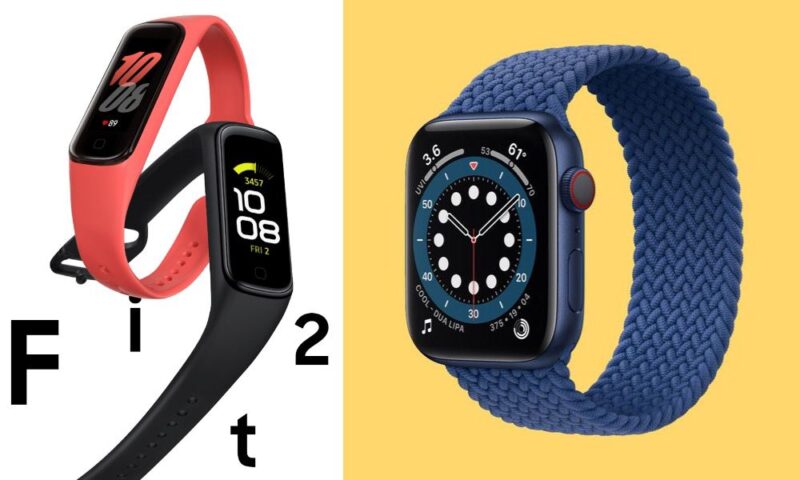Wearables have become a major part of how we track health, stay connected, and simplify daily routines. If you’re considering getting a wrist device, you’re likely wondering, “Should I go for a smartwatch or a fitness band?” Each has its strengths and trade-offs. In this post, I’ll help you weigh the pros and cons so you can choose the wearable that fits your lifestyle, needs, and budget.
What Are They?
-
Smartwatches are like mini computers on your wrist. They offer fitness tracking, notifications, apps, sometimes GPS, music controls, payments, voice assistants, and more.
-
Fitness bands (or trackers) are more focused: steps, heart rate, sleep tracking, sometimes SpO₂, calories, and basic notifications. Their features are simpler and generally fewer than a smartwatch.
Key Differences: Smartwatches vs. Fitness Bands
| Feature | Smartwatches | Fitness Bands |
|---|---|---|
| Display & Design | Larger, more colorful screens, more stylish, premium materials. | Smaller, slimmer, lighter, and more discreet. |
| Battery Life | Usually shorter—many smartwatches need charging every 1-2 days. | Longer battery—some fitness bands last 5-10 days or more, depending on usage. |
| Features beyond Fitness | Richer: apps, voice assistants, some have LTE/cellular, payment features, and music storage. | Minimal extras—basic notifications, maybe music control, but mostly dependent on your phone. |
| Accuracy & Sensors | Better sensors on higher-end models: built-in GPS, more advanced health metrics (ECG, advanced sleep tracking). | Good for basics: steps, heart rate, and sleep. Less likely to have advanced sensors like ECG or multi-band GPS. |
| Comfort & Wearability | Bulkier and heavier; more attention to style. Might feel heavy during workouts or sleep. | Very lightweight and subtle; better for 24/7 wear and sleeping. |
| Price | More expensive because of richer features. | More budget-friendly overall. |
Pros & Cons
Here are some advantages and drawbacks of each to help you decide:
Smartwatches
Pros:
-
Full functionality: notification management, apps, payments, music, and GPS.
-
More advanced health tracking: better sensors, richer data.
-
Ability to use it more independently: some allow phone calls, texts, etc., without always having your phone.
Cons:
-
Battery life is often short, having to recharge every day or every other day.
-
More expensive, especially premium models.
-
Bulkier design; less comfortable during sleep or intensive workouts.
-
Might have features you won’t use, which means paying for more than you need.
Fitness Bands
Pros:
-
Lightweight, comfortable, and ideal for sleeping and continuous wear.
-
Very good battery life; less frequent charging.
-
Affordable; you get essential health and fitness tracking without spending too much.
-
Simpler to use, less confusing interface, and fewer notifications mean less distraction.
Cons:
-
Fewer smart features—less access to apps, payments, and voice assistants.
-
Smaller screens can make reading texts/notifications harder.
-
Some fitness bands lack built-in GPS, so accuracy for running, cycling routes may depend on your phone.
-
Less customization in design, watch faces, and accessories.
What to Consider Before Buying
To decide what’s right for you, think about the following:
-
Battery vs. Features
How often are you okay with charging the device? If daily charging is annoying, a fitness band might suit you better. -
Use Cases
Do you want fitness tracking only? Or do you also want calls, apps, or paying from your wrist? -
Display and Comfort
If you plan to wear it all day or overnight, comfort, size, and weight matter a lot. -
Budget
Set a price limit. Smartwatches tend to cost more; fitness bands give more value per dollar if your needs are basic to mid-level. -
Brand & Ecosystem Compatibility
If you use an iPhone, some smartwatches work better than others. Same with Android. Also, check for app support and updates. -
Durability & Sensors
If you’ll be working out a lot or doing outdoor activities, look for water resistance, reliable sensors, and good GPS (if needed).
Which Should You Choose?
Here are some recommendations based on common profiles:
-
You just want fitness basics (steps, sleep, heart rate, light workouts) → go with a fitness band.
-
You want more than fitness (notifications, apps, maybe phone-free features like calls or payments) → consider a smartwatch.
-
You travel a lot or are always outdoors → battery life and durability matter; fitness bands might be lighter, and smartwatches with rugged builds might be good.
-
You want style/fashion. → Since smartwatches often have more premium designs and more watch face/band options, these can double as accessories.
Final Verdict
There’s no one-size-fits-all answer. Smartwatches pack in power, versatility, and features—but they cost more and demand more from you (especially in charging). Fitness bands, by contrast, are about simplicity, endurance, and comfort.
If I were in your shoes, I’d pick the device that fills what you need most. If it’s long battery life, comfort, and tracking basic health, go for a fitness band. If you want wrist convenience, connection, apps, and more smart features, go with a smartwatch.
Whichever you choose, today’s options are much better than ever—either can help you stay healthier, more active, and better connected.








